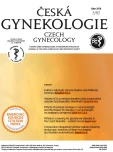Fetal and neonatal alloimmune thrombocytopenia
Authors:
A. Neumann 1; Z. Žižka 1; M. Koucký 1; H. T. Bolcková 2; P. Calda 1
Authors‘ workplace:
Gynekologicko-porodnická klinika VFN a 1. LF UK, Praha, přednosta prof. MUDr. A. Martan, DrSc.
1; Ústav hematologie a krevní transfuze, Praha, přednosta prof. MUDr. P. Cetkovský, Ph. D., MBA
2
Published in:
Ceska Gynekol 2018; 83(6): 448-451
Category:
Case Report
Overview
Objective:
This article shows our experience with fetal and neonatal alloimmune thrombocytopenia (FNAIT) on a particular patient and the difficulties we faced during the hospitalization.
Design:
Case report.
Setting:
Department of Obsterics and Gynecology 1st Faculty of Medicine, Charles University and General Faculty Hospital in Prague.
Methods:
Our experience with FNAIT therapy.
Results:
According to literature is recommended to use IVIG for FNAIT treatment. Women, who were treated by IVIG have better results, in comparison with women, who had no treatment at all. Our case is not confirming this statement, because first pregnancy of our patient terminated by IUFD, on the other hand second pregnancy was successful and she delivered healthy child.
Conclusion:
FNAIT is relatively rare disease, but if it appears, it can be dangerous for a fetus or for a new-born baby. In the worst case FNAIT can result in intracranial bleeding or prenatal death. There are limited preventive steps and available therapy produces uncertain results. The only partially accepted treatment substance is IVIG (intravenous immunoglobulins). Unfortunately, this therapy is very expensive and not accepted by some experts. This article shows our experience with FNAIT on a particular patient and the difficulties we faced during the hospitalization.
Keywords:
fetal and neonatal alloimmune thrombocytopenia, FNAIT, trombocytopenia, intracranial hemorrhage, misscarriage, IVIG
Sources
1. Berkowitz, RL., Lesser, ML., McFarland, JG., et al. Antepartum treatment without early cordocentesis for standard-risk alloimmune thrombocytopenia: a randomized controlled trial. Obstet Gynecol, 2007, 110, p. 249–255. Epub 2007/08/02.
2. Bussel, JB., Berkowitz, RL., McFarland, JG., et al. Antenatal treatment of neonatal alloimmune thrombocytopenia. N Engl J Med, 1988, 319, p. 1374–1378. Epub 1988/11/24.
3. Calda, P., Břešťák, M., Fischerová, D. Ultrazvuková diagnostika v těhotenství a gynekologii. 2. kompletně přeprac. a rozšířené vyd. Praha: Aprofema, 2010. 496 s.
4. Čermáková, Z., Kovářová, P., Malušková, A. Optimalizace vyšetření protilátek proti trombocytům u těhotných žen po porodu. Čes Gynek, 2011, 76, 3, s. 239–242.
5. Daffos, F., Capella-Pavlovsky, M., Forestier, F. Fetal blood sampling via the umbilical cord using a needle guieded by ultrasound, report od 66 cases. Prenat Diag., 1983, 3, p. 271–277. Epub 1983/10/01
6. Dahl, J., Refsum, E., Ahlen, MT., et al. Unraveling the role of maternal anti-HLA class I antibodies in fetal and neonatal thrombocytopenia – antibody specificity analysis using epitope data. J reprod Immunol, 2017, 122, p. 1–9.
7. McQuilten, ZK., Wood, EM., Savola, H. A review of pathophysiology and current treatment for neonatal alloimmune thrombocytopenia (NAIT) and introducing the Australian NAIT registry. Aust N Z J Obstet Gynaecol, 2011, 51(3), p. 191–198.
8. Pacheco, LD., Berkowitz, RL., Moise, KJ. Jr., Brussel, JB. Fetal and neonatal alloimmune thrombocytopenia: a management algorithm based on risk stratification. Obstet Gynecol, 2011, 118(5), p. 1157–1163.
9. PROFNAIT. 2016. Available from: http://www.profnait.eu/
10. Santoso, S., Wihadmadyatami, H., Bakchoul, T., et al. Antiendothelial alphavbeta3 antibodies are a major cause of intracranial bleeding in fetal/neonatal alloimmune thrombocytopenia. Arterioscler Thromb Vasc Biol, 2016, 36, p. 1517–1524. Epub 2016/06/11.
11. Turner, ML., Bessos, H., Fagge, T., et al. Prospective epidemiologic study of the outcome and cost-effectiveness of antenatal screening to detect neonatal alloimmune thrombocytopenia due to anti-HPA-1a. Transfusion, 2005, 45(12), p. 1945–1956.
12. Winkelhost, D., Oepkes, D., Lopriore, E. Fetal and neonatal alloimmune thrombocytopenia: evidence based antenatal and postnatal managment strategies, Expert Rev Hematol, 2017, 10(8), p. 729–773.
13. Yougbare, I., Lang, S., Yang, H., et al. Maternal anti-platelet beta3 integrins impair angiogenesis and cause intracranial hemorrhage. J Clin Invest, 2015, 125, p. 1545–1556. Epub 2015/03/17
Labels
Paediatric gynaecology Gynaecology and obstetrics Reproduction medicineArticle was published in
Czech Gynaecology

2018 Issue 6
-
All articles in this issue
- The effect of myomectomy on the morphology uterine and tubal factor of infertility
- Radiofrequency endometrial ablation – new possibility of heavy menstrual bleeding conservative treatment
- Perinatal mortality and morbidity in Slovak Republic in the years 2007–2015
- Asherman‘s syndrome: the description of two case reports
- Fetal and neonatal alloimmune thrombocytopenia
- New potential biomarkers for preeclampsia prediction
- Surrogate motherhood: the contradicitons in terminology
- Etiology, risk factors, and methods of postpartum depression prevention
- Ectopic pregnancies: a retrospective cohort analysis in a tertiary reference center in the Northeast Region of Brazil
- Gynecological tumor triplicity
- Strumal carcinoid of the ovary – report of two cases and review of literature
- Czech Gynaecology
- Journal archive
- Current issue
- About the journal
Most read in this issue
- Etiology, risk factors, and methods of postpartum depression prevention
- Radiofrequency endometrial ablation – new possibility of heavy menstrual bleeding conservative treatment
- Asherman‘s syndrome: the description of two case reports
- Perinatal mortality and morbidity in Slovak Republic in the years 2007–2015
